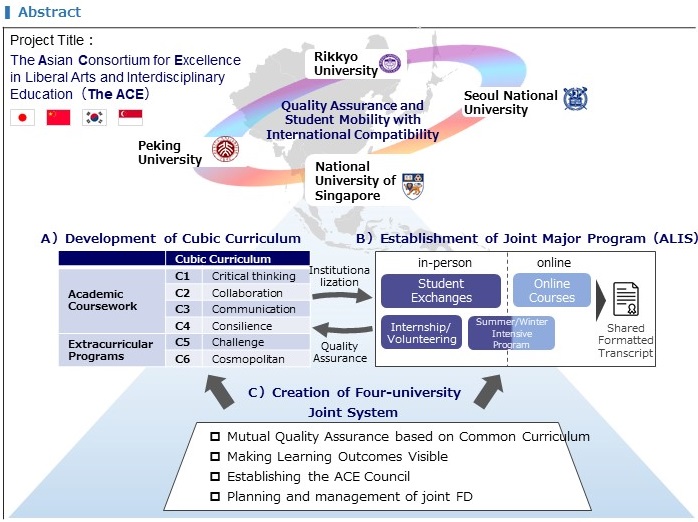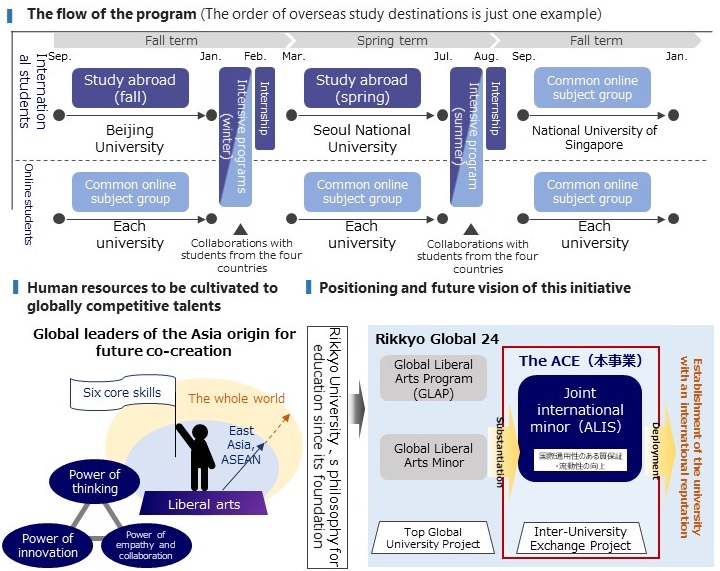Rikkyo University goes more global
Liberal arts-based educational program to start in 2022 in partnership with 3 leading Asian universities
Rikkyo University
Mar 18, 2022
OVERVIEW
In November 2021, Rikkyo University became the only private university newly selected for the “Inter-University Exchange Project (Re-Inventing Japan Project); Support for the Formation of Collaborative Programs with Universities in Asia (working name)” when the Ministry of Education, Culture, Sports, Science and Technology (MEXT) announced the results of screening for the project. The project aims to foster human resources who can excel on the global stage and strengthen Japanese universities’ global reach. The government will provide financial support for undertakings made through international educational collaboration to dispatch Japanese students abroad and accept international students, while aiming to guarantee the quality of higher education. We asked Hideyuki Matsui, Vice President for International Advancement, about Rikkyo University’s specific undertakings for the project, as well as its internationalization efforts. The following is an excerpt from the interview.
Becoming global leaders who can act toward solving problems of international society through collaboration with Asian students
In this new project, Rikkyo University will partner with leading Asian universities¬; Seoul National University (South Korea), Peking University (China) and the National University of Singapore (Singapore). They are ranked ninth, second and third, respectively, in THE Asian University Rankings 2021*. I’m confident that the quality of Rikkyo University’s research and education will improve further through students’ exchange and joint development of curriculum with these three leading Asian universities.
*The rankings are released every year by Times Higher Education (THE), a British educational journal. The University of Tokyo ranked sixth, the highest for a Japanese university.
Seoul National University (South Korea)
Peking University (China)
the National University of Singapore (Singapore)
Participating in the program at this stage are students who belong to GLAP, College of Business and College of Intercultural Communication. I hope participating students will spread the knowledge they gain through the program widely with other students.
What are the joint international minor (ALIS)and C6ubic Curriculum, which are designed to cultivate six core skills?

In principle, the four universities will dispatch a total of about 12 students per year to partner universities for one year (two semesters). Basically, each student will be dispatched to two universities, while taking classes from the joint online subject group to gain knowledge at the third university. Students will mainly take courses conducted in English, which enable them to acquire the core skills of C6ubic Curriculum. In overseas studies, students can study in more than three countries, including Japan. Participating students will be able to achieve a great deal, because they can compare the culture and mindset in Asian countries with their own.
2) Intensive Program (summer/winter)
Programs consisting of lecture and activities are for students who are enrolled in the long-term exchange program among the four universities and last 14 days or so (subject to change). The four universities plan to take turns in providing the program’s venue and all dispatch teachers for the program. Students will engage in project-based collaborative work with students from other countries. This will inspire participating students, who will be able to learn first-hand about diverse ways of thinking in other countries through group discussion and presentations.

Each university will offer relevant subjects online, creating a subject group consisting of around four subjects per semester or around eight per year, whose credits are transferable among the four universities.
We are also considering a scheme that allows students outside the project to take intensive programs and the common online subject group to the extent that is possible.
4) Internship or social contribution activities
We are thinking about having participants in the long-term exchange program among the four universities to take an internship or engage in social contribution activities for two weeks or so in the summer and winter recesses. The program offers participants a chance to act on their initiative in solving various problems in the Asian region and think about building an international career in the future through work experience or activities in foreign countries.
5) International cultural exchanges
Through the above-mentioned four programs, participants will be able to engage in international cultural exchanges with participating students from other countries. Rikkyo University, for its part, will promote international cultural exchanges with students from the four universities through exchange events being held at its Global Lounge, among others.
Area of learning is based on liberal arts
English is the working language in the program. Students will also aim to master basic Korean and Chinese
Moreover, participating students who stay in South Korea and/or China will be expected to learn Korean and/or Chinese because they will have a chance to use those languages. They are not asked to attain a level of proficiency in those languages before they stay in those countries. But after the first semester, they should aim to achieve the capability of using the languages at Level 4 or 5 in the Chinese proficiency test HSK, or the Korean proficiency test TOPIK.
Generous student support system, including mutual tuition fee exemption scheme
Accumulating internationalization efforts for further sophistication
In recent years, Rikkyo University has tried to become a university with an outstanding ability to convey its message across Asia. In planning this program, we were able to solidify our relationship with the three universities. We would like to take this opportunity to increase the number of students going to Asian nations for studying and realize substantive international exchanges in Asia.
Professor Hideyuki Matsui, Vice President for International Advancement
RECENT TOPICS
Oct 17, 2025
MSDA Rikuzentakata Field Trip 2025
Master of Social Development and Administration (MSDA) Course
Profile
Hideyuki Matsui
Professor, Department of International Business Law, College of Law and Politics
Born in Aichi Prefecture in 1970. Graduated from the Faculty of Law, the University of Tokyo in March 1994 and completed the master’s program in law at the university’s Graduate Schools for Law and Politics in March 1996. After serving as a program officer at the university’s Faculty of Law, he became a full-time lecturer at Rikkyo University’s College of Law and Politics in 1999. He was promoted to assistant professor and associate professor before becoming a full professor in October 2008. He has served as chair of the Department of Law, College of Law and Politics, dean of the President’s Office and vice director of the Organization for Global Initiatives.